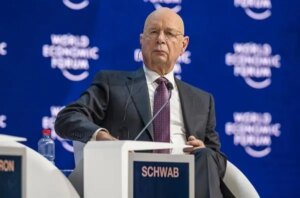The Winds of Change: Klaus Schwab’s Departure from the World Economic Forum

Klaus Schwab at the World Economic Forum
In a significant shift within global governance, Klaus Schwab, the 87-year-old founder of the World Economic Forum (WEF), has announced his departure from the leadership role he has held for decades. While Schwab’s exit may appear to some as a simple leadership change, it symbolizes a crack in the elite-driven agenda of “stakeholder capitalism,” revealing cracks in a previously unassailable narrative.
The Context of Schwab’s Exit
As the architect of concepts such as the Great Reset and Agenda 2030, Schwab has faced mounting criticism and resistance. His vision of a society built around stakeholder capitalism—essentially, a system where corporations serve a wider array of interests rather than solely their shareholders—has been met with skepticism worldwide. The push for these utopian ideals has faltered amid the realities of economic decline and public resistance.
Despite his strategic handover of some executive duties to Borge Brende—a Norwegian politician with an ambitious agenda to rally major nations like China, the US, and India to WEF initiatives—support for his vision has weakened significantly. The current geopolitical landscape is far from conducive to such alliances, making Brende’s task increasingly daunting.
Acknowledging Failure
In a candid moment with the Financial Times, Schwab mentioned, “What is essential now after the turmoil of the last months, is to recover our sense of mission.” His acknowledgment of failing initiatives and diminishing influence highlights the challenges faced by globalists. The election of figures like Donald Trump, for example, posed a serious challenge to the WEF’s framework, suggesting a nationalistic pushback against global governance.
Trump’s executive order outlawing Central Bank Digital Currencies (CBDCs) marked a decisive stand against Schwab’s vision of a cashless society—a world where financial transactions could be monitored and controlled. This loss is compounded by the decline of pivotal figures such as Boris Johnson and Justin Trudeau, who once championed various WEF initiatives but now find themselves less influential.
The Realities of Globalist Policies
The globalist policies advocated by Schwab and the WEF have been struggling under their weight. Nations worldwide, notably those in Europe, are grappling with economic decline largely attributed to such idealistic policies, including the controversial Net Zero initiative. Germany, historically the economic powerhouse of Europe, faces a decline due to prioritizing ideology over practicality—leading to energy shortages and deindustrialization.
Investment firms, once all-in on Environmental, Social, and Governance (ESG) criteria, are reassessing their positions. Even Larry Fink of BlackRock has now acknowledged the failures inherent in stakeholder capitalism and ESG frameworks. This shift indicates a broader realization that the theories driving an agenda steeped in idealism simply do not translate into practical reality for most nations.
The Rise of Public Awareness
The mantra “You will own nothing and be happy,” once the hallmark of WEF rhetoric, now echoes with irony as citizens worldwide begin to push back against such ideologies. There is a growing awareness and resistance among the populace that has led to an awakening, with citizens increasingly voting against globalist agendas and authoritarian governance structures.
Nevertheless, Schwab’s resignation should not be seen as a defeat of the globalist vision. The infrastructure developed under his leadership remains largely intact, with affiliated think tanks, NGOs, and infiltrated governments continuing to champion similar agendas. The global community must stay vigilant, for while the tide may be turning against some of the more extreme aspects of the WEF’s proposals, the push for a one-world government continues in various forms.
Final Thoughts
As Schwab steps away from the WEF’s helm, the implications are vast and layered. This turning point reveals not just a transition in leadership but signals potential shifts in global power dynamics. The ideologies espoused by the WEF might be facing challenges, but they are not fully eradicated.
At Extreme Investor Network, we are committed to providing you with in-depth analysis and insights into these unfolding narratives. Our goal is to empower our readers with the knowledge to navigate the complexities of global economics and the implications for their investments. In a time marked by uncertainty and change, staying informed is your best asset.
Join us as we continue to deliver cutting-edge analysis at the intersection of economics, politics, and investment strategy. Subscribe to our newsletter and follow our blog for the latest insights and expert commentary on the evolving economic landscape!

